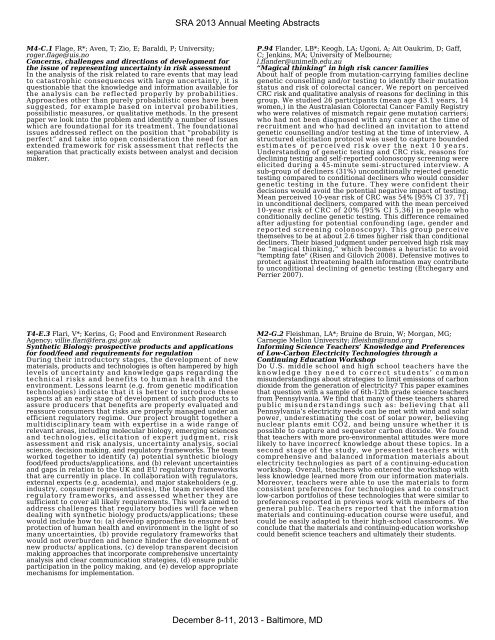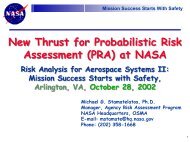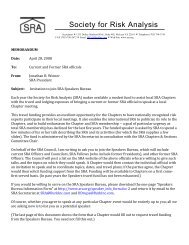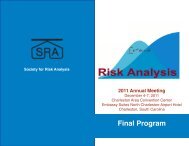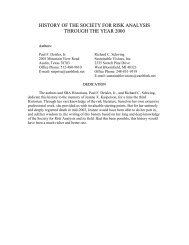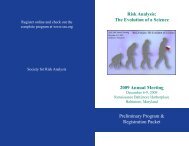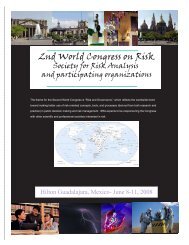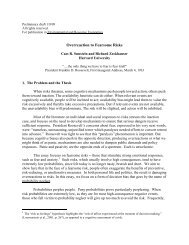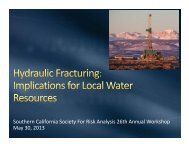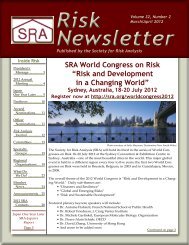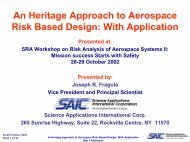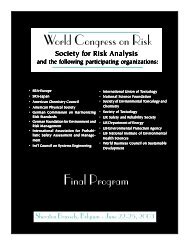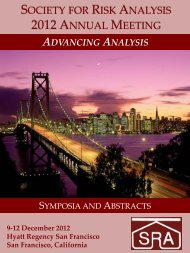Abstracts (PDF file, 1.8MB) - Society for Risk Analysis
Abstracts (PDF file, 1.8MB) - Society for Risk Analysis
Abstracts (PDF file, 1.8MB) - Society for Risk Analysis
Create successful ePaper yourself
Turn your PDF publications into a flip-book with our unique Google optimized e-Paper software.
SRA 2013 Annual Meeting <strong>Abstracts</strong><br />
M4-C.1 Flage, R*; Aven, T; Zio, E; Baraldi, P; University;<br />
roger.flage@uis.no<br />
Concerns, challenges and directions of development <strong>for</strong><br />
the issue of representing uncertainty in risk assessment<br />
In the analysis of the risk related to rare events that may lead<br />
to catastrophic consequences with large uncertainty, it is<br />
questionable that the knowledge and in<strong>for</strong>mation available <strong>for</strong><br />
the analysis can be reflected properly by probabilities.<br />
Approaches other than purely probabilistic ones have been<br />
suggested, <strong>for</strong> example based on interval probabilities,<br />
possibilistic measures, or qualitative methods. In the present<br />
paper we look into the problem and identify a number of issues<br />
which are foundational <strong>for</strong> its treatment. The foundational<br />
issues addressed reflect on the position that “probability is<br />
perfect” and take into open consideration the need <strong>for</strong> an<br />
extended framework <strong>for</strong> risk assessment that reflects the<br />
separation that practically exists between analyst and decision<br />
maker.<br />
P.94 Flander, LB*; Keogh, LA; Ugoni, A; Ait Oaukrim, D; Gaff,<br />
C; Jenkins, MA; University of Melbourne;<br />
l.flander@unimelb.edu.au<br />
“Magical thinking” in high risk cancer families<br />
About half of people from mutation-carrying families decline<br />
genetic counselling and/or testing to identify their mutation<br />
status and risk of colorectal cancer. We report on perceived<br />
CRC risk and qualitative analysis of reasons <strong>for</strong> declining in this<br />
group. We studied 26 participants (mean age 43.1 years, 14<br />
women,) in the Australasian Colorectal Cancer Family Registry<br />
who were relatives of mismatch repair gene mutation carriers;<br />
who had not been diagnosed with any cancer at the time of<br />
recruitment and who had declined an invitation to attend<br />
genetic counselling and/or testing at the time of interview. A<br />
structured elicitation protocol was used to capture bounded<br />
estimates of perceived risk over the next 10 years.<br />
Understanding of genetic testing and CRC risk, reasons <strong>for</strong><br />
declining testing and self-reported colonoscopy screening were<br />
elicited during a 45-minute semi-structured interview. A<br />
sub-group of decliners (31%) unconditionally rejected genetic<br />
testing compared to conditional decliners who would consider<br />
genetic testing in the future. They were confident their<br />
decisions would avoid the potential negative impact of testing.<br />
Mean perceived 10-year risk of CRC was 54% [95% CI 37, 71]<br />
in unconditional decliners, compared with the mean perceived<br />
10-year risk of CRC of 20% [95% CI 5,36] in people who<br />
conditionally decline genetic testing. This difference remained<br />
after adjusting <strong>for</strong> potential confounding (age, gender and<br />
reported screening colonoscopy). This group perceive<br />
themselves to be at about 2.6 times higher risk than conditional<br />
decliners. Their biased judgment under perceived high risk may<br />
be “magical thinking,” which becomes a heuristic to avoid<br />
"tempting fate" (Risen and Gilovich 2008). Defensive motives to<br />
protect against threatening health in<strong>for</strong>mation may contribute<br />
to unconditional declining of genetic testing (Etchegary and<br />
Perrier 2007).<br />
T4-E.3 Flari, V*; Kerins, G; Food and Environment Research<br />
Agency; villie.flari@fera.gsi.gov.uk<br />
Synthetic Biology: prospective products and applications<br />
<strong>for</strong> food/feed and requirements <strong>for</strong> regulation<br />
During their introductory stages, the development of new<br />
materials, products and technologies is often hampered by high<br />
levels of uncertainty and knowledge gaps regarding the<br />
technical risks and benefits to human health and the<br />
environment. Lessons learnt (e.g. from genetic modification<br />
technologies) indicate that it is better to introduce these<br />
aspects at an early stage of development of such products to<br />
assure producers that benefits are properly evaluated and<br />
reassure consumers that risks are properly managed under an<br />
efficient regulatory regime. Our project brought together a<br />
multidisciplinary team with expertise in a wide range of<br />
relevant areas, including molecular biology, emerging sciences<br />
and technologies, elicitation of expert judgment, risk<br />
assessment and risk analysis, uncertainty analysis, social<br />
science, decision making, and regulatory frameworks. The team<br />
worked together to identify (a) potential synthetic biology<br />
food/feed products/applications, and (b) relevant uncertainties<br />
and gaps in relation to the UK and EU regulatory frameworks<br />
that are currently in place. In collaboration with regulators,<br />
external experts (e.g. academia), and major stakeholders (e.g.<br />
industry, consumer representatives), the team reviewed the<br />
regulatory frameworks, and assessed whether they are<br />
sufficient to cover all likely requirements. This work aimed to<br />
address challenges that regulatory bodies will face when<br />
dealing with synthetic biology products/applications; these<br />
would include how to: (a) develop approaches to ensure best<br />
protection of human health and environment in the light of so<br />
many uncertainties, (b) provide regulatory frameworks that<br />
would not overburden and hence hinder the development of<br />
new products/ applications, (c) develop transparent decision<br />
making approaches that incorporate comprehensive uncertainty<br />
analysis and clear communication strategies, (d) ensure public<br />
participation in the policy making, and (e) develop appropriate<br />
mechanisms <strong>for</strong> implementation.<br />
M2-G.2 Fleishman, LA*; Bruine de Bruin, W; Morgan, MG;<br />
Carnegie Mellon University; lfleishm@rand.org<br />
In<strong>for</strong>ming Science Teachers’ Knowledge and Preferences<br />
of Low-Carbon Electricity Technologies through a<br />
Continuing Education Workshop<br />
Do U.S. middle school and high school teachers have the<br />
knowledge they need to correct students’ common<br />
misunderstandings about strategies to limit emissions of carbon<br />
dioxide from the generation of electricity? This paper examines<br />
that question with a sample of 6th-12th grade science teachers<br />
from Pennsylvania. We find that many of these teachers shared<br />
public misunderstandings such as: believing that all<br />
Pennsylvania’s electricity needs can be met with wind and solar<br />
power, underestimating the cost of solar power, believing<br />
nuclear plants emit CO2, and being unsure whether it is<br />
possible to capture and sequester carbon dioxide. We found<br />
that teachers with more pro-environmental attitudes were more<br />
likely to have incorrect knowledge about these topics. In a<br />
second stage of the study, we presented teachers with<br />
comprehensive and balanced in<strong>for</strong>mation materials about<br />
electricity technologies as part of a continuing-education<br />
workshop. Overall, teachers who entered the workshop with<br />
less knowledge learned more from our in<strong>for</strong>mation materials.<br />
Moreover, teachers were able to use the materials to <strong>for</strong>m<br />
consistent preferences <strong>for</strong> technologies and to construct<br />
low-carbon portfolios of these technologies that were similar to<br />
preferences reported in previous work with members of the<br />
general public. Teachers reported that the in<strong>for</strong>mation<br />
materials and continuing-education course were useful, and<br />
could be easily adapted to their high-school classrooms. We<br />
conclude that the materials and continuing-education workshop<br />
could benefit science teachers and ultimately their students.<br />
December 8-11, 2013 - Baltimore, MD


